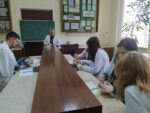Laboratory for Soils and Natural Waters Analysis
- Про підрозділ
- Staff
Про підрозділ

Established at the Department of Soil Geography in 2002 to provide educational and informational-communicative functions as follows:
- doing analytical assignments by students;
- upgrading educational quality standards in soils studies and soils geography, land use ecology and applied ecology;
- invigorating educational and methodological cooperation in the field of soils studies and soils geography with leading Ukrainian (Kyiv, Odessa, Kharkiv, Chernivtsi) and foreign (the University of Warsaw (Poland), M. Skłodowska-Curie University (Lublin, Poland), Jagiellonian University (Kraków, Republic of Poland), Vienna) universities;
Equipped with modern appliances and devices such as ionometers, conductometers, flame photometers, spectra spot photometers, polarograph.
Practicum courses “Soil Studies”, “Soil Chemistry”, Geospheres Chemistry”, “Hydrochemistry” for students doing complex laboratory and practical assignments on the topics as follows are based at the Laboratory:
- Gravimetric analysis: defining hygroscopic water in the environment;
- Ways of expressing the composition of solutions;
- Electrolytic dissociation. Water dissociation. Hydrogen indicator. Colorimetric and potentiometric measurement of pH-environment;
- Characteristics of buffer solutions. Buffer capacity. Preparing buffer solutions and measurement of buffer capacity of natural waters and soils;
- Chemical properties and role of cations in natural waters. Qualitative reactions on cations;
- Chemical properties and role of anions in natural waters. Qualitative reactions on anions;
- Chemical composition of soil. Qualitative analysis of soils water and chloride extraction.
- Titrimetric analysis. Acid estimation and determination of hardness index in natural waters.
- Photometric analysis. Measurements of ferrum and ammonium compounds in water;
- Oxidation-reduction potential. Oxidation-reduction potentials of environmental objects (water, soil) measurement;
- Defining deoxidizing agents by means of permanganometry. Defining ferrum volumes in iron ore.
- Tropospheric chemistry. Defining sulphur, carbon, chlorine compounds in the atmospheric air;
- Titrimetric defining of deoxidizing and oxidizing agents by means of iodometry;
- Chelatometry (complexometry). Defining water hardness;
- Conductometric determination of weak electrolytes ionization degree and constant. Measurement of electrical conductivity of natural waters and soil suspensions;
- Conductometric titrations. Defining calcium carbonate solubility product;
- Potentiometric titrations. Defining soil buffer capacity;
- Colloidal systems. Obtaining of lyophobic sols. Detection of the character of colloidal particles charges;
- Ion exchange adsorption. Adsorption chromatography research methods. Partition of substances mixtures by means of paper and column chromatography;
- Surface-active materials. Surface tension. Defining surface tension in natural waters and influence of synthetic surface-active materials (detergents) on surface tension;
- Solid dispersion systems. Sediment analysis. Defining of fraction composition of soil particles.
The Laboratory carries out experimental studies both within the curricula of course and diploma papers, Master’s theses and in the framework of scientific students’ groups such as “Antropogenic Transformation of Soils”, “Ukraine’s Black Soils”, “Water and Soil Ecology”.
Staff
| Laboratory Chief ManagerNataliya Yefimchuk | Laboratory Chief Manager |
| 1st Category EngineerHalyna Hnatyshyn | 1st Category Engineer |
| 1st Category EngineerRoman Semashchuk | 1st Category Engineer |